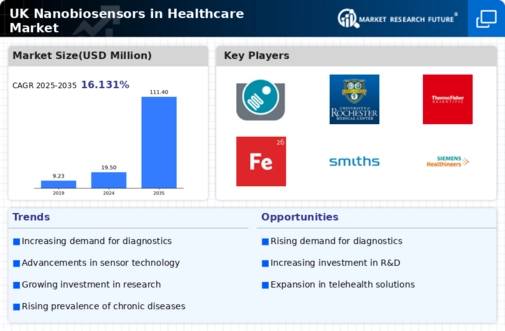Market Growth Projections
The Global UK Nanobiosensors in Healthcare Market Industry is poised for substantial growth, with projections indicating a market size of 1250 USD Million in 2024 and an anticipated increase to 3750 USD Million by 2035. This represents a remarkable CAGR of 10.5% from 2025 to 2035, highlighting the increasing adoption of nanobiosensors across various healthcare applications. The growth trajectory reflects the rising demand for advanced diagnostic tools and monitoring solutions, driven by technological advancements and the need for efficient healthcare delivery. As the industry evolves, the integration of nanobiosensors into clinical practice is likely to expand, further enhancing their market presence.
Government Initiatives and Funding
Government initiatives and funding play a pivotal role in shaping the Global UK Nanobiosensors in Healthcare Market Industry. Various governmental bodies are investing in research and development to promote the integration of nanotechnology in healthcare. These initiatives aim to foster innovation and support the commercialization of nanobiosensors. Increased funding for healthcare technology projects is expected to drive advancements in nanobiosensor applications, ultimately enhancing patient care. As a result, the market is poised for growth, with a projected CAGR of 10.5% from 2025 to 2035, reflecting the commitment of governments to advance healthcare technologies.
Increasing Prevalence of Chronic Diseases
The rising prevalence of chronic diseases is a critical driver for the Global UK Nanobiosensors in Healthcare Market Industry. Chronic conditions such as diabetes, cardiovascular diseases, and cancer necessitate continuous monitoring and management, which nanobiosensors can facilitate effectively. The ability to provide real-time data on patient health status empowers healthcare professionals to make informed decisions. As the population ages and lifestyle-related diseases become more common, the demand for innovative monitoring solutions is likely to increase. This trend underscores the importance of nanobiosensors in managing chronic diseases, thereby enhancing their market potential.
Growing Awareness of Personalized Medicine
The growing awareness of personalized medicine significantly influences the Global UK Nanobiosensors in Healthcare Market Industry. As healthcare shifts towards tailored treatments based on individual patient profiles, the role of nanobiosensors becomes increasingly vital. These devices enable precise monitoring of biomarkers, facilitating the development of personalized therapeutic strategies. The demand for such targeted approaches is expected to drive market growth, as healthcare providers seek to improve treatment efficacy and patient outcomes. This trend aligns with the broader movement towards personalized healthcare, suggesting a promising future for nanobiosensors in this evolving landscape.
Rising Demand for Point-of-Care Diagnostics
The Global UK Nanobiosensors in Healthcare Market Industry experiences a notable surge in demand for point-of-care diagnostics. This trend is driven by the need for rapid and accurate testing solutions in various healthcare settings. Nanobiosensors, with their high sensitivity and specificity, are increasingly utilized for real-time monitoring of diseases. For instance, the market is projected to reach 1250 USD Million in 2024, reflecting the growing preference for decentralized healthcare solutions. As healthcare providers seek to enhance patient outcomes through timely interventions, the adoption of nanobiosensors is likely to accelerate, contributing to the overall growth of the industry.
Technological Advancements in Nanotechnology
Technological advancements in nanotechnology significantly propel the Global UK Nanobiosensors in Healthcare Market Industry forward. Innovations in materials science and engineering enable the development of more efficient and effective nanobiosensors. These advancements enhance the capabilities of nanobiosensors, allowing for the detection of biomolecules at unprecedented levels of sensitivity. As a result, the market is expected to expand, with projections indicating a growth to 3750 USD Million by 2035. This growth is indicative of the potential applications of nanobiosensors in personalized medicine and targeted therapies, which are becoming increasingly relevant in modern healthcare.




















